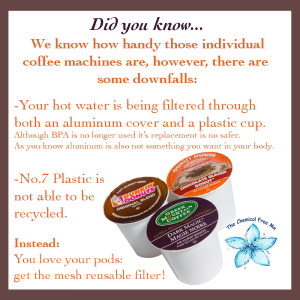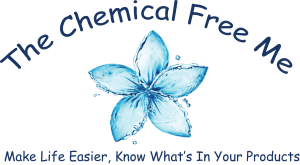What is the price for convenience?
Are there hidden toxins in coffee pods? While some companies are “exploring” how to produce a pod that can be recycled, others have given the option of collecting them from you (as you reorder). Neither option measures up to the convenience these pods are supposed to provide. K-cups currently claims they offer recyclable pods, however, of all the options available you will not find many. I found 5 choices, all Green Mountain Coffee,  that can be recycled.
that can be recycled.
Why is it so difficult to recycle them?
The water that passes through the pod is approximately 192 degrees, so they need to remain stable for that temperature. On average, a coffee pod is made of FOUR different layers. One of the layers is often plastic number 7, which is not always an option to recycle.
For the record it is stated that one can separate all the layers to recycle what can be recycled. I am not confident this is even a notable percentage of people. If it IS done apparently the size remaining becomes an issue at the recycling facilities.
Are there health concerns?
Yes. As we now know plastics are full of BPA, (BPA free is not a safer alternative its been proven to be more toxic) BPS, polystyrene, and phthalates which are known endocrine disruptors. It is the reason we exchanged our plastic water bottles for stainless steel and glass. We are reminded not to drink from the plastic bottles left in a heated car, as they break down and leach into your water, increasing your risks for cancer. I would venture to guess that streaming hot water through four sturdy layers would also leach toxins into your coffee.
The gross factor?
It is impossible to completely drain the tank lines of water. That means you have a brewing ground for bacteria. Mold and biofilm create yet another list of health issues.
What about the aluminum pods?
Aluminum exposure has been linked to Alzheimer’s, anxiety, and autoimmune diseases. Personally I opt out of anything aluminum when at all possible.
So what is the solution?
You CAN brew your own coffee-for a significantly cheaper price, eliminating the convenience for environmental and health issues. You CAN opt for some of the newer pods that are not in plastic at all, and are biodegradable. It is not perfect-you are still using a foil or plastic top, however toxins are cumulative so the more you eliminate the better off you are.
The opinion of the original inventor? He wishes he had not invented them and has thought of solutions for the problems, but people have yet to listen.
